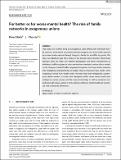For better or for worse mental health? : The role of family networks in exogamous unions
Abstract
This study tests whether being in an exogamous union affects older individual's family networks, and whether associations between exogamy and mental health reported in previous studies operate through changes in family ties and differ by gender. We focus on individuals aged 60 or above in the German Socio‐Economic Panel Study between 2002 and 2016. We describe demographic and family characteristics of individuals in different types of union and estimate correlated random effects models on the changes of mental health. Exogamous immigrants have larger family networks than endogamous immigrants due to a higher chance of having in‐laws nearby, while exogamous natives have smaller family networks than their endogamous counterparts. Native women in a union with immigrants exhibit worse mental health than endogamous native women, and the same disadvantage is held by immigrant men partnered with native women. Family networks influence mental health but contribute little to observed differences.
Citation
Eibich , P & Liu , C 2021 , ' For better or for worse mental health? The role of family networks in exogamous unions ' , Population, Space and Place , vol. 27 , no. 6 , e2437 . https://doi.org/10.1002/psp.2437
Publication
Population, Space and Place
Status
Peer reviewed
ISSN
1544-8452Type
Journal article
Description
Funder: H2020 European Research Council (Grant Number(s): 834103).Collections
Items in the St Andrews Research Repository are protected by copyright, with all rights reserved, unless otherwise indicated.

